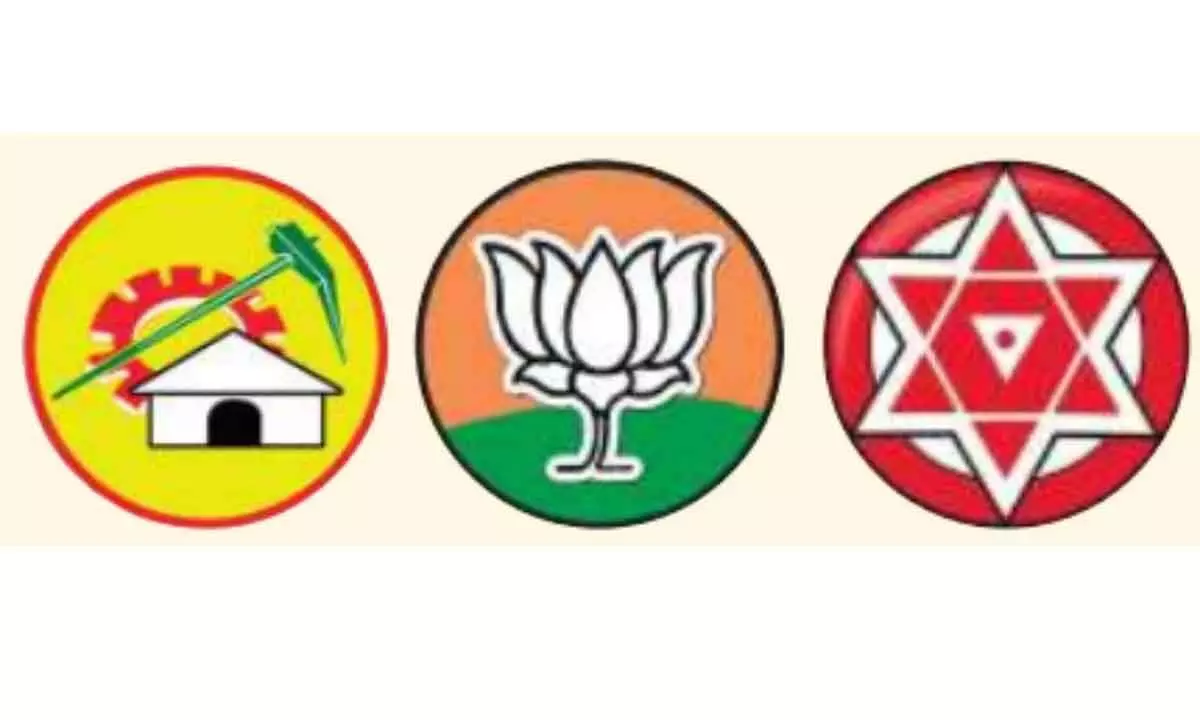Live
- Ukrainian attacks with British weapons will invite retaliation, Russia tells UK
- Indian airlines poised to capture 50% of country’s global passenger traffic: CRISL
- Entire NC unit in Ladakh's Kargil quits party to protest LS alliance
- Sharad Pawar to cast vote in Baramati after a decade
- Difference Between Business Credit Score and Personal Credit Score
- Indian Bank posts 55% jump in Q4 net profit, declares dividend of Rs 12 per share
- Govt showcases India as 365-day tourist destination at Arabian Travel Mart
- Pulwama to Poonch - Congress not learning from past mistakes, experts reckon
- ISRO moves ahead in development of 2,000 kN thrust semi-cryogenic engine
- FLiRT Covid variants: No need for panic or extra caution, say experts
Just In
Why BJP may veer to embrace TDP-JSP combine


The BJP at Centre is making some very quick moves to ensure that it emerges stronger after the 2024 general elections. Though it is confident of...
The BJP at Centre is making some very quick moves to ensure that it emerges stronger after the 2024 general elections. Though it is confident of coming back to power in the ensuing Lok Sabha elections on its own strength, it wants to enlist the support of more and more political parties as it will seek passage of important and controversial bills like the Uniform Civil Code and the National Register for Citizens during the Modi 3.0 tenure.
Close on the heels of Bihar Chief Minister and JD(U) chief Nitish Kumar re-joining the BJP-led NDA, the BJP seems to have set its eyes on Andhra Pradesh. It is likely to take back TDP into the NDA fold as it is convinced that the winds are in favour of TDP-Jana Sena combine. The state BJP unit also submitted a report to the high command, saying that even I-PAC reports are making the YSRCP spend sleepless nights. They feel that the ruling party may not get more than 40 seats.
Hence, BJP feels that it would be a win-win situation to rope in TDP-Jana Sena as it will help them get a couple of seats both in Assembly and Lok Sabha elections. In return, it can offer two or three berths in the Union Cabinet. The state, too, will need Centre’s support to put the state economy back on track. All this will help in further weakening the fragmented bloc called I.N.D.I.A and it can easily push through all the controversial bills in Lok Sabha and Rajya Sabha. A strong NDA is must to pass such bills because the Modi-led government had fixed 2024 as the deadline for implementing the NRC across the country.
The National Register of Citizens so far has been an Assam- specific exercise to keep the ethnic uniqueness unaltered. It is basically prepared to identify bona fide residents and deport illegal migrants from Bangladesh. The NDA wants that it should be implemented country-wide. The Union government wants to table a bill that would help the government identify infiltrators, detain and deport them.
Another controversial bill is Uniform Civil Code. It has been a contentious issue in Indian politics for a long time though it is included as a Directive Principle in the Indian Constitution. Article 44 of Chapter IV states, “The State shall endeavour to secure the citizens a Uniform Civil Code throughout the territory of India.”
This has also been part of the BJP’s manifesto for the 1998 and 2019 elections. A bill on the UCC was sought to be introduced in November 2019 by Narayan Lal Panchariya for its introduction, but had to be withdrawn due to Opposition protests. Again in 2020, Kirodi Lal Meena brought up the bill but again it failed. There have also been petitions filed in the Supreme Court seeking equality in laws related to marriage, divorce, adoption, and succession.
In 2018, a consultation paper had noted that there were certain practices within the family law regimes which discriminate against women and need to be addressed. In the Shah Bano case in 1985, regarding the rights of a Muslim woman in divorce, the Supreme Court observed that “Parliament should outline the contours of a common civil code as it is an instrument that facilitates national harmony and equality before law.”
Against this backdrop, the NDA 3.0 government wants to pass all such controversial bills if possible in the first year of its 3.0 rule. Hence, it is making all-out efforts to rope in more and more alliance partners.

© 2024 Hyderabad Media House Limited/The Hans India. All rights reserved. Powered by hocalwire.com






